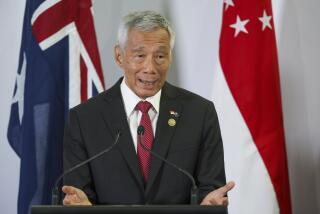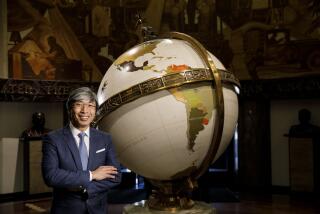Interim Leader Named to Take Over in Hong Kong
- Share via
BEIJING — Career civil servant Donald Tsang was named Hong Kong’s interim chief executive Saturday, replacing the unpopular Tung Chee-hwa, who stepped down citing health reasons.
Tsang will hold the seat until a new leader is elected July 10 to serve out the remaining two years of Tung’s term. Many believe Beijing has already picked Tsang, 60, to serve through 2007, and possibly beyond.
Critics have blasted the process, arguing that key decisions were made in Beijing with the rules bent to serve China’s interests. Formal selection of the chief executive in July and again in 2007 will be made by a committee of 800 Hong Kong elites, most of them pro-China.
Many in Hong Kong believe that authorities will use the next two years to test Tsang’s loyalty and performance before deciding whether to install him for a full five-year term.
At a news conference Saturday, Tsang touched on two challenges he faces: gaining Beijing’s confidence and calming pro-democracy critics.
He told reporters that Hong Kong “would spare no effort” to help unify Taiwan and the mainland. Taiwan split from China in 1949 after a civil war. Beijing sees Hong Kong’s “one country, two systems” formula as a model for unification with Taiwan.
Tsang also acknowledged the concerns of critics who say that under Hong Kong’s mini-constitution, the next leader should serve a five-year term.
“If there is any challenge, we will meet the challenge,” Tsang said. “My task is to conduct the elections fairly and in strict accordance with the law.... I am not thinking about anything else.”
“Tsang will try his best, but the problem isn’t his ability, it’s the position he’s in between Beijing and Hong Kong people,” said Liu Ruishao, a Hong Kong commentator.
Tsang enjoys more support in Hong Kong than did his predecessor. By most indications, he also has far more political skill than Tung, who many believe was pushed out by Beijing.
The son of a policeman, Tsang joined the bureaucracy in 1967 without a college degree. He received a master’s degree from Harvard in 1981 and has a record of overcoming challenges.
As finance minister during the Asian financial crisis of 1998, he thwarted currency speculators by shoring up the stock market with public funds.
More to Read
Sign up for Essential California
The most important California stories and recommendations in your inbox every morning.
You may occasionally receive promotional content from the Los Angeles Times.













